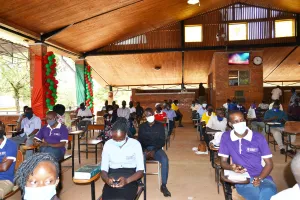By Asenath Were
The outbreak of COVID-19 pandemic in 2020 presented a significant challenge for churches in Uganda. With restrictions on public gatherings as a mechanism to curb the spread of the coranavirus, many churches had to adapt quickly in order to continue providing spiritual support and guidance to their members.
Most churches decided to embrace online church in order to keep their congregations motivated in such a devastating moment.
However, after the restrictions were relaxed by the government and churches were allowed to have physical prayers, it seems some people are more comfortable with the online services.
According to Rev. Canon. Eng. Paul Wasswa, the Uganda Christian University (UCU) Chaplain, this is so because the students find the online services more convenient; that is to say, it reduces costs for those who have to put in transportation to get to the areas of worship, and it also eases engagement for worship.
He added that, while online prayers promise to provide some experience, they don’t, primarily due to distraction, and you don’t achieve the same level of engagement in worship as you would in person.
“The Biblical concept of worship is an in-person experience, in that when I am in the same place of worship with you, I gain more in person. Worship is not just connecting with God; it also involves connecting with God. He said.”
To him, the in-person gathering in a sanctuary enhances the worship experience more than the gathering on the internet. “There is power in accountability. By going to church and having my friends see me go to church, I build a physical accountability, which is not the case with the online prayers. Wasswa Commented.
Furthermore, he emphasized that physical engagements provide a platform for one to identify his or her gift, grow it, and exercise it. For example, if your gift is singing, those at church can easily help you identify it, and then you can join the choir and improve that gift.
According to Ritah Kayaga, a second-year BBA student, online services are not bad, but they are addictive and make people lazy. Most people use it as an excuse because it solves the problems of distance and food if the church is far away.
“It is a good thing, however, it makes people lazy, while physical services are more focused because someone can log into a service but then continue with their everyday activities.” Kayaga said.
She urged that the students be educated, trained, sensitized, and encouraged to focus whenever they choose to attend online services, but she also encouraged them to attend physical services on a regular basis.
Edrine Ssetimba, a third-year law student, the effects of COVID 19, which resulted in the introduction of online services, make prayer meetings and fellowships difficult to attend, making it difficult for spiritual growth to occur in the lives of the youth.
“Since young adults are vibrant people and hate monotony and easily find services boring, they opt to do life alone, which is challenging without spiritual edifying sessions. People we used to pray with are distant, and reaching out to them is next to impossible,” he commented.
Lilly Aber, a second-year student of SWASWA, suggested that church leaders and other church participants need to encourage others to join them by telling them about the love of Christ and the importance of physical services.


